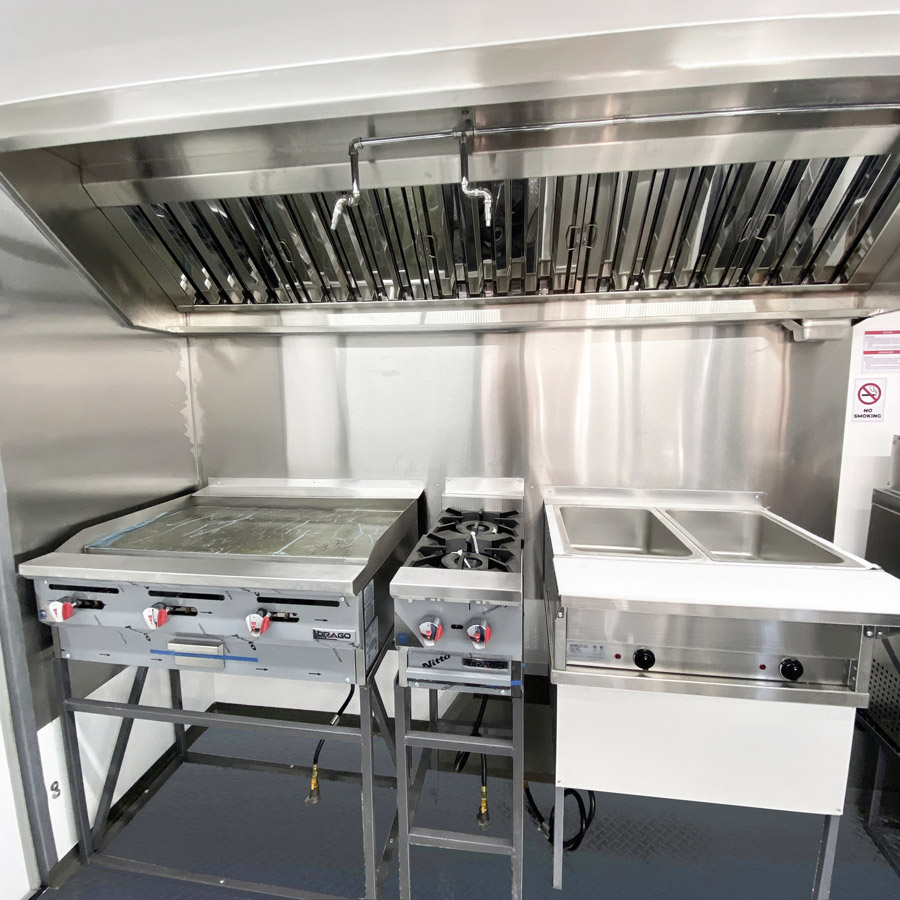Mobile Food Trailer Setup: Essential Equipment
Starting a mobile food business is an exciting opportunity, but one of the most critical steps is getting the right equipment for your food trailer setup. The success of your business depends not only on your recipes and branding but also on how well your trailer is equipped to handle daily operations.
At The Fud Trailer Company, we specialize in building and outfitting custom food trailers designed for efficiency, compliance, and profitability. In this guide, we will walk you through the essential equipment for mobile food trailer setups, covering everything from kitchen appliances to safety features.
Why the Right Equipment Matters
The equipment inside your trailer directly affects:
Food quality: Consistent cooking and storage ensure customer satisfaction.
Efficiency: Proper layout and tools reduce wait times and increase sales.
Safety: Meeting health and fire standards keeps your business compliant.
Longevity: Durable, commercial-grade appliances reduce repair costs.
A mobile food trailer without the proper setup risks slower service, wasted ingredients, and potential shutdowns by local health departments.
Step 1: Cooking Equipment Essentials
The cooking appliances you choose should reflect your menu. Common essential items include:
Grills and Griddles – Perfect for burgers, sandwiches, and breakfast items.
Deep Fryers – Essential for fried foods like fries, chicken, or seafood.
Ovens – Needed for baking, roasting, or pizza-based menus.
Stovetops and Burners – Provide flexibility for sautéing and boiling.
At The Fud Trailer Company, we recommend energy-efficient and space-saving models that meet local fire and ventilation regulations.
Step 2: Refrigeration and Storage
Keeping ingredients fresh is vital for both food safety and flavor. Every mobile food trailer setup should include:
Commercial Refrigerators and Freezers – Maintain consistent temperatures for perishable items.
Undercounter Refrigeration – Saves space while keeping ingredients close to the prep area.
Dry Storage Cabinets – For non-perishable ingredients, paper goods, and packaging.
Investing in high-quality refrigeration equipment ensures compliance with health codes and reduces spoilage costs.
Step 3: Food Preparation Stations
Efficient prep areas keep your operation smooth. Consider:
Stainless Steel Prep Tables – Durable, easy to clean, and compliant with regulations.
Cutting Boards and Tools – Sanitary prep equipment to avoid cross-contamination.
Ingredient Bins – For organized storage of flour, sugar, or bulk items.
Proper prep stations also improve staff workflow, reducing bottlenecks during peak service hours.
Step 4: Sanitation and Compliance Equipment
Health departments have strict requirements for mobile kitchens. Essential sanitation equipment includes:
Three-Compartment Sink – Required for washing, rinsing, and sanitizing dishes.
Handwashing Sink – Mandatory in most states, with hot and cold water access.
Water Tanks – Freshwater and wastewater tanks sized according to local codes.
Soap and Paper Towel Dispensers – To meet hygiene standards.
At The Fud Trailer Company, we design every trailer with proper plumbing systems and sanitation equipment to ensure regulatory compliance.
Step 5: Ventilation and Safety Systems
Safety is non-negotiable in a food trailer. Your setup must include:
Exhaust Hood Systems – Remove smoke, grease, and heat from the cooking area.
Fire Suppression System – Automatically extinguishes flames in case of fire.
Fire Extinguishers – Rated for grease and electrical fires.
Non-Slip Flooring – Prevents accidents in tight spaces.
Failing to install these systems can delay health department approvals or even put your business at risk.
Step 6: Serving and Point-of-Sale Equipment
A great setup goes beyond the kitchen—it also focuses on customer interaction. Essential front-end tools include:
Service Windows – With sliding glass or stainless steel for easy transactions.
Cash Register or POS System – Digital systems help track sales and inventory.
Menu Boards and Digital Displays – Attract customers and showcase specials.
An efficient serving area improves customer flow and creates a better overall experience.
Step 7: Power and Utility Systems
Food trailers need reliable power sources to run appliances. Common options are:
Onboard Generators – A must-have for trailers operating in areas without electrical hookups.
Shore Power Connection – Ideal for permanent or semi-permanent setups.
Propane Systems – Efficient for cooking appliances.
The Fud Trailer Company ensures every trailer has safe, well-installed utility systems to handle daily demands.
Step 8: Branding and Exterior Design
Your trailer’s exterior is as important as the kitchen inside. Key elements to include:
Custom Vinyl Wraps – Eye-catching designs to attract attention.
Exterior Lighting – For night operations and visibility.
Logo and Menu Placement – Strategically positioned for maximum impact.
A professionally branded trailer becomes a mobile billboard for your business.
Step 9: Optional but Valuable Add-Ons
Depending on your budget and goals, you may consider extra features such as:
Digital menu screens for dynamic pricing and promotions.
Extra storage compartments for catering events.
Air conditioning units for staff comfort.
Solar panels for eco-friendly energy solutions.
These upgrades can set your business apart from the competition.
Mistakes to Avoid When Setting Up a Food Trailer
Choosing household appliances instead of commercial-grade equipment.
Ignoring local health and safety regulations.
Underestimating power and water needs.
Skipping professional installation for critical systems.
Overcrowding the trailer with unnecessary equipment.
Avoiding these mistakes can save thousands of dollars and keep your business running smoothly.
Conclusion
Setting up a mobile food trailer with essential equipment is a major step toward building a successful food business. From cooking appliances and refrigeration to safety systems and branding, every detail matters.
At The Fud Trailer Company, we not only sell and build food trailers but also guide entrepreneurs in choosing the right equipment, ensuring compliance, and creating custom designs that maximize efficiency and sales.
If you’re ready to launch your food trailer business, our team is here to help you every step of the way.
Contact Us to start your project today


